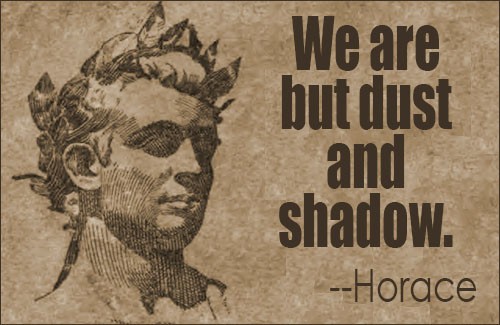by Ed Whelan, Contributing Writer, Classical Wisdom
“Mediocrity in poets has never been tolerated by either men, or gods, or booksellers.”
So wrote Horace, one of the most celebrated of all the Roman poets. He lived during the Golden Age of Latin literature which occurred in the last decades of the Roman Republic, and continued into the First Century A.D. Great writers such as Vergil, Tacitus, and others created masterpieces that have proven to be enormously influential. The work of Quintus Horatius Flaccus (65-8 BC), better known as Horace, offers a unique insight into Roman life and thought of the period. He also provided a vision of the world that continues to inspire readers to this day.
The life of Horace
The poet was born to a freed slave who was probably originally from the highlands of central Italy. His father, whom Horace greatly respected, became a moderately successful businessman in Venusia. Horace’s family was affluent enough to send him to be educated in Rome. In about 46 BC the future poet travelled to Athens. After the assassination of Julius Caesar, Greece was occupied by his assassins. Horace joined the Republican army of Brutus and Cassius. While serving in the army, he became an officer, fought at the Battle of Philippi (42 BC) and commanded a legion. After the total defeat of Brutus and Cassius, however, Horace fled back to Italy.
He returned to discover that his father’s property had been confiscated by Octavian (later, better known as the first Roman Empoeror, Augustus). Horace was later pardoned for serving in the army of the assassins of Julius Caesar, and he became a clerk in the Roman treasury. During his time in Rome, he circulated some of his poems and they came to the attention of Gaius Maecenas, one of the most powerful men in Rome. He became Horace’s patron, and the poet joined a circle of writers, which included Vergil. At some date Maecenas introduced him to Octavian. It appears that Horace supported the Principate, like so many other members of the elite, to prevent Rome descending into another Civil War. Some have criticized Horace for becoming associated with a tyrant like Augustus. It does seem that Horace did benefit from his relationship with the first Roman Emperor, but based on his verse he still retained some of his old Republican sympathies.
It appears from his poetry that he accompanied Maecenas on a journey to the south of Italy and may have even been present at the Battle of Actium. Horace became a good friend of Augustus who offered him a role in his government, but the poet refused and preferred the simple life. He was later made a Knight. He died not long after his patron Maecenas.
The work of Horace
His finest early poetry of Horace were the Epodes that were modelled on Hellenistic verse and were written after the Battle of Philippi. These poems are concerned with satire, love and occasionally politics. During his first years in Rome, Horace wrote the Satires. These are often humorous, but they were also profoundly philosophical. Horace was an Epicurean who wanted a life of peace (ataraxia) and he believed that the best way to achieve this was by self-sufficiency and to enjoy a simple life of pleasure. The Satires are an attempt to show how men could live in accordance with traditional values in the new age ushered in by Augustus.
After the Battle of Actium (31 BC), Horace wrote another book of satires. His most important works are considered to be his Odes. Some of these verse praise Augustus, but also denounce what the poet saw as the corruption in Roman life. These Odes, which were modelled on Classical Greek examples, also portray elite life in Rome and argue for a simple life dedicated to small pleasures. These poems were not well received by his critics. Next Horace wrote his Epistles, letters in verse. His most important epistle was the Ars poetica (19 or 18 BC). This is often mistakenly regarded as a piece of literary criticism. In fact, it provides insights into the nature of poetry. In this work Horace argues that the poet, or indeed any artist, should hone his or her natural ability by long years of study. Horace’s health declined as he grew older and one of his last know works was a long poetic work Secular Hymn. He also completed some more odes despite their relative unpopularity before his death.
Influence of Horace
The poetry of Horace was enormously influential. The work of Ovid and the Roman elegist Propertius were deeply influenced by his Odes. Despite his Epicurean views, the poet was very popular in the Medieval era, and was possibly the most influential Latin writer for many centuries. Horace’s work was widely read in the Renaissance and deeply impressed Petrarch. Many prose writers frequently quoted Horace, and his Odes and Epistles were widely translated. Generations of schoolboys grew up with the works of Horace. Many scholars argue that Horace’s ideas on a refined, yet simple life played a key role in the development of the concept of a ‘gentleman’. This was an enormously important social concept until the 20th century in the western world.
Conclusion
Horace was a Republican who used his poetic gifts to flourish in the Principate. He was one of the greatest of all Latin poets. He promoted a view of the world that has proven to be enormously popular. Horace’s works decisively shaped western poetry for over a millennium, but in recent decades because of changing tastes his appeal has declined. Nevertheless, one phrase of his remains eternally popular: carpe diem – seize the day.
References
Hornblower, S., Spawforth, A. and Eidinow, E. eds., 2012. The Oxford classical dictionary. Oxford University Press.
Commager, S., 1995. The odes of Horace: A critical study. University of Oklahoma Press.












No comments
Trackbacks
Our apologies, you must be logged in to post a comment.